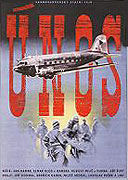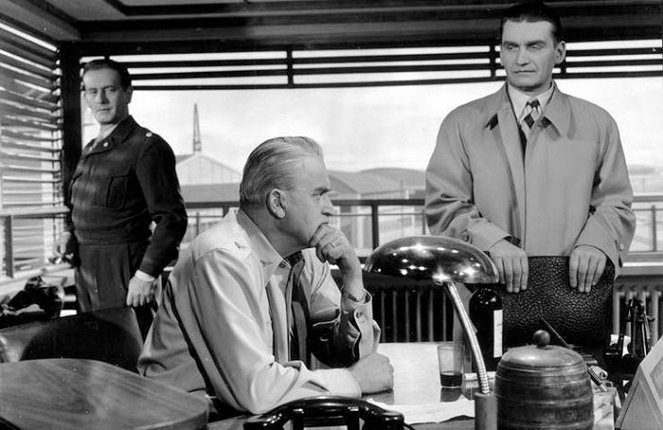Cámara:
Rudolf MiličMúsica:
Jiří ŠustReparto:
Jiří Dohnal, Ladislav Pešek, Antonín Klimša, Jaroslav Mareš, Božena Obrová, Bohuš Záhorský, Miloš Kopecký, František Hanus, Rudolf Deyl ml. (más)Sinopsis(1)
Expert engineer Prokop and deputy Horvát can't reach an agreement over the plans for the forthcoming construction works in the big industrial plant in Ostrava. Their disagreement should be solved at the Ministry and they both fly to Prague for this reason. At this time, Prokop's assistant Šimáček gets arrested. Nobody suspected that he was an American spy. The plane is filled with people. Only two crew members, Grábner and Král, and three passengers - Grábner's wife, Řezníček and Rychman, know that the plane won't land in Prague. Hijackers are taking over the plane and landing it at the American army airport near Munich. The American officials soon realize that most of the passengers won't ask for asylum but want to go back to their country. The original plan was to seize the plane with different passengers, but the arrested Šimáček didn't pick up the tickets and they were finally put back on sale. Engineer Prokop refuses to collaborate with the American spies. The valuable industrial plans are destroyed in secret by his fellow-travellers. Deputy Horvat also refuses to betray his country. He manages to escape after an interrogation and, with the help of German anti-fascists and the Czechoslovak consul, manages to get the kidnapped Czechoslovak citizens back to their country. (texto oficial de la distribuidora)
(más)Reseñas (4)
Whereas American musicals have Singin’ in the Rain (also made in 1952), the propaganda films of the Czechoslovak Communist Party have Kidnapped. The film’s heavenly prologue, supported by appropriately majestic music, reveals the filmmakers’ considerable ambitions. Later, this “epic” impression is evoked by transferring part of the plot to the grounds of the United Nations. The organisation with a reputation as an international moraliser was also misused for the typically Czech narrow-minded point of the whole film: just let them vote at the UN, and we will vote for what we want at home! And unanimously! Other highlights of this pseudo-spy pseudo-thriller include the International’s singing in unison and the identification of a comrade thanks to his addition of the essential hammer to an abandoned sickle. ___ The bearer of the ideas of the Communist Party is a comrade of the most deliberate kind, deputy Horvát (which is a Hungarian rather than a purely Czech surname, but we are still on the soil of a friendly country, so that’s okay). This member of parliament is decisive and incorruptible, and thus unanimously followed by his true-blue fellow citizens. The narrative formula involving the ideological “cure” of a doubting comrade takes the form of the engineer Prokop. From a “political illiterate” living under the bad impression made by the capitalist world, he is transformed into a man whose head and heart belong to Communism. Others who don’t recoil from bribes in the form of Western food (instead of eating paper with the others) and find pleasure in decadent American culture (Kopecký’s jazz musician) are beyond help. Let them perish in the West! ___ Collectivism, one of the central value norms of Communist ideology, is highlighted throughout the narrative. A Czech (i.e. Communist) is always part of a larger collective and must mainly be careful not to betray the domestic representation, which he can always rely on in an emergency. His interests are transpersonal, motivated by the beneficial effect for the whole republic. Therefore, every gesture carries political weight. Because taking action means disseminating Communist ideals, speaking for oneself and expressing one’s own thoughts would be a betrayal (this is also why it’s necessary to make the apolitical Prokop politically aware). ___ Conversely, the negative characters act of their own accord. They pursue only personal enrichment through their socially irresponsible actions. They necessarily look at the ideological tenacity of the Czech people, who are immune to the American dollar and brute force, with astonishment (“What kind of people are these?”). The capitalists long ago traded all ideals for dollars. Proclaiming “the customer is king”, the capitalist deals with business matters even when he should be invested in his fellow man and his health. Even in his self-centeredness, however, the character representing Western values humbly admits that “your heavy industry is competition for us”. Besides his heightened interest in financial matters, you can also recognise an imperialist based on his devotion to the idea of war. It is necessary to be on guard, because the West is ceaselessly arming itself against the peace-loving countries of the East. The motivation for killing? Money, of course. Among other things, the root of warmongering is the surviving legacy of Nazism (Wanke’s SS uniform coat). ___ The work of degeneracy is completed with comical English (“Okay, boys”) and action scenes peppered with lines like “Lock up, you bastards!” Today we laugh at it, convinced that we ourselves would not be fooled by such transparent ideological manipulation. Or would we? Would it really not have occurred to us somewhere deep in our minds that it’s damned cool to be Czech and always go to the left (or today very much to the right)? Because of such questions, it makes sense to keep an eye on such atrocities, though with a wary sense of amusement, and to examine the mechanisms by means of which the “truth” of a particular group is passed off as the truth of an entire nation. 40%
()
(menos)
(más)
Kidnapped is propaganda that is so transparently formulaic and, at the same time, so skilfully crafted that it’s hard to believe that the whole thing wasn’t a deliberate parody. Whereas blatant propaganda like Tomorrow, People Will Be Dancing Everywhere clings to insipidness and lobotomisation in all circumstances, Kadár and Klos actually wrap ideological immorality up in the precise style of a thriller, as if to subvert not only the format of the propaganda film, but also western pulp thrillers. [Brakfest warm-up 2021]
()
It's not as nicely fleshed out as other agitprops, so it may seem like a more insidious film. It’s too bad that after two reruns the charm of the "evil" film is definitely gone and all that is left is just plain boredom and the awkwardness of everyone involved. The Dohnal and Pešek generation are ironing out their apolitical older films, while the young folks, led by the boxer Peterka, are just aimlessly smiling. Regarding the singer Červená, they're just trying to have a modern-day vamp. They hum the Internationale, sew their shirts (to disgrace the flag), and are not fabulous at all. So much for my first two encounters with Kidnapped. The third time around, I went into it in a completely different mood and found several new insights. These included banalities such as the fact that Hrušínský's English is lousy, that Dohnal, instead of exhibiting his mature acting strengthened by his long years at the National Theater, cannot even speak properly under the layer of a disgusting mask, and that despite this inspiring environment, Pešek considered his role here to be quite crucial in his dramatic career. How is this possible? The script is a true balance between audacity, arrogance, stupidity (senility, dementia...), and the ineptitude we so often witnessed in the early years of nationalized film. And yet Kidnapped is original in its own way, in its conception of Americans as less than caricature templates, as walking imbeciles who communicate in sparkling dialogue along the lines of "...and Engineer Prokop is my Trojan horse." - "I don't know that type of horse, we never had one like that here in the US. Absolutely not." They counter with nonsensically black and white crude parallels between the ever-receding fear of concentration camp practices and the current inclusion of war criminals in the machinery of American "democratic" progress. We also get the ubiquitous "Hello!," the affectionate "Ami Go Home" and the thesis of the nationalization of the United Nations, the Sudeten German question is abused, the internship in Moscow is looked forward to and the Munich follies are danced into the mix. American soldiers are serving because they would otherwise be unemployed and have no idea why they should shoot their fellow Czechs - unless they are on the run. Is that still not enough for you? Okay, great. Now let's enjoy the symbolism of the fly imprisoned and released, let's have some fun with the hidden meaning of the question mark, which is after all so cleverly used as a sickle, and let's naturally applaud Karen for his "good" jailer. Nedbal for his rape of every piece of furniture he touched, or lay on, during an interrogation or any other narcissistic etude. Samohana is bad, but is Kopecký's hesitant motif equally bad? Didn't Pešek have it too easy when he was avenging his dead family, something that Milda, who only yearned for Western culture, couldn't compete with? Will I ever again encounter a worse-functioning red group that feeds exclusively on paper? Will Chef Hlinomaz understand who the Bolsheviks are? How come Eda Kohout was overshadowed by Hanus as always, even though he had a higher batch? Will I believe in the Barrandov career of Lída Vostrčilová or will I be lucky enough to survive Inocenc Březina’s performance? Is he oral fixation and Vykypěl's intonation enough for my level of black humor? Can I ever forget the incredibly insane performance of the smug Dubský or the WTF journalists Effa and Myzet? And was the meeting between Klose and Kadár truly happy one? After all, they are responsible not only for the direction but also for the theme and the script.
()
(menos)
(más)
Kidnapped amounts to a bunch of nonsense. It is shot quite skillfully (a pity to waste such directors for films of this kind), but that doesn't save it from criticism. In the story you will find everything you would expect - cunning imperialists in the form of a pair of plump men smoking Havana, a heroic comrade who is not only not easy to break, but actually impossible to break, a hesitant engineer who won't betray his friends anyway, and an even more hesitant jazzman who at first falls for the American devil, but when he wants to change his mind at the right time, it's too late. Of course, we also get the singing of the Internationale at the most difficult moment, speeches about miners, factories, the people who stand behind every good comrade, the final exuberant dance and so on... I give one (red) star for the direction of (some!) scenes (the hijacking of the plane, the landing in Germany) and for the music by Jiří Šust. That's all.__P.S. Poor Miloš Kopecký.
()

